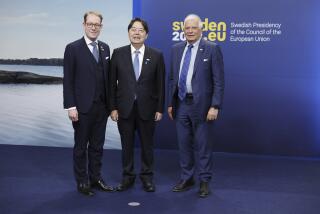EC Alarmed by Japan’s Inroads
- Share via
TOKYO — European Communities’ nightmare that Japanese exporters will switch from the U.S. market to Europe is coming true, a top EC official said Friday.
Trade figures are beginning to show a disturbing and substantial shift of sales from the United States to the community’s 320 million consumers, Laurens Jan Brinkhorst, the EC ambassador to Japan, told reporters. “Obviously, it is a question of major concern for us.”
Japanese companies are searching for alternative outlets for their products because the yen’s strength against the dollar has cut their price competitiveness.
Apart from the United States, Japan has only three major markets developed enough to pick up the overflow quickly--the EC, China and Southeast Asia.
But Peking has made it clear to Tokyo that it will not allow even the current level of Japanese imports to continue. The powerful bureaucracy in Peking is already making sure that domestic companies buy fewer Japanese cars and television sets.
Exports to China in May fell a drastic 32% to $738.96 million, compared to May last year. The Assn. of Southeast Asian Nations (ASEAN)also fears the worst.
“We hope that Japan does not regard ASEAN purely as a supplier of her primary raw materials and a dumping ground for her excess manufactured goods,” Malaysian Foreign Minister Tengku Ahmad Rithauddeen told his Japanese counterpart, Shintaro Abe, last Thursday.
Neither market can match wealthy Europe’s ability to buy Japanese exports.
Brinkhorst quoted Japanese figures showing that the total January to May exports to the EC rose 53%to $11.89 billion, compared to a year ago, while imports from the community rose 34.6%. The matter will be taken up at talks with Japan in Brussels starting July 7, he said.
The situation presents a new headache for Tokyo just as it believed that its major trade fight with Washington was easing because of its efforts to raise the value of the yen.
This has been at the expense of the Japanese economy, which contracted in the first quarter of this year for the first time in 11 years.
The Ministry of International Trade and Industry earlier this month urged Japanese car makers to moderate sales of passenger cars to the EC after a 120% jump from a year ago. If companies are switching exports as a long-term strategy, the EC is particularly worried because Japanese corporate techniques emphasize winning and keeping market share.
Brinkhorst said a reasonably healthy current 3% growth rate in the EC economies went some way to explain the rise in consumer demand.
More to Read
Sign up for Essential California
The most important California stories and recommendations in your inbox every morning.
You may occasionally receive promotional content from the Los Angeles Times.












